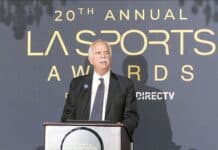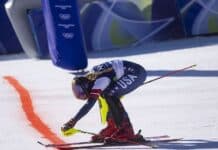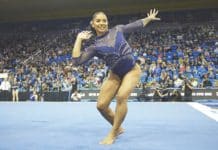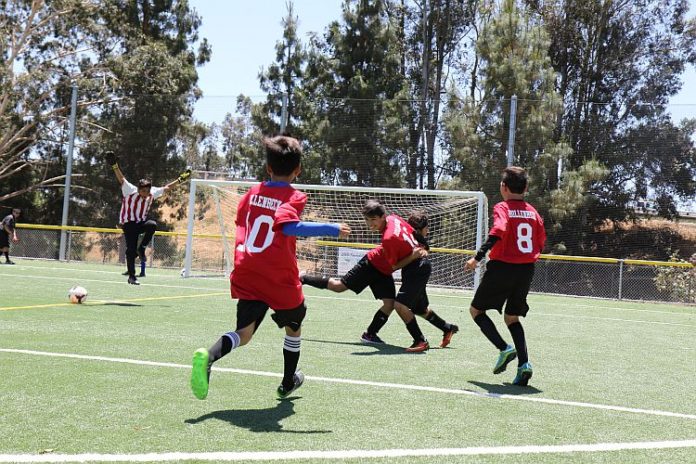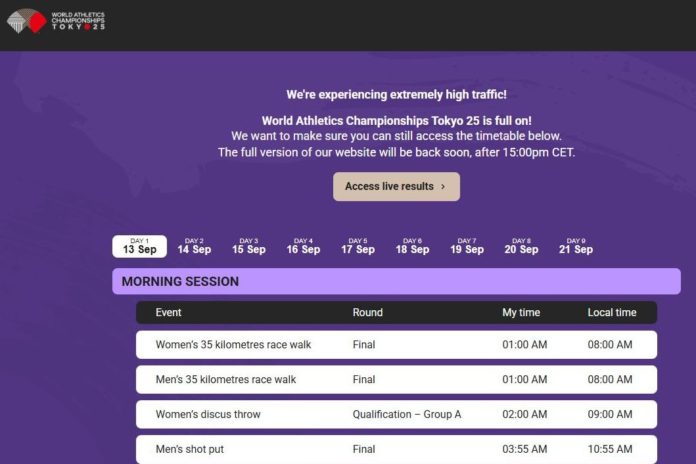/John Moffet was a member of the 1980 and 1984 U.S. Olympic Swimming teams. He was a five-time individual NCAA Champion at Stanford, where he was team captain. Following his athletic career, he has been a three-time Emmy Award-winning TV producer. He serves as President of the Southern California Olympians & Paralympians Association. Moffet’s opinions are, of course, his own alone./
During a California Senate Health Committee hearing, Renata Simril reached for the microphone when asked for her remedy for the state’s growing inequities in youth sports. To help more kids play, what would a system look like for greater access to sports for families and communities?
As president of the Play Equity Fund, Simril is a national leader in sports-based youth development. Her organization builds opportunities for kids from all backgrounds to be involved in sports, play and movement. She has spread the word to policymakers about the symptoms and causes of the challenges afflicting youth sports in California, and nationally.
It is a system that fails millions of kids, and divides access by race, economics and class. Simril’s answer was revealing – with a solution on the horizon.
“This is why AB 749 is so critical,” she said. “It will show us what we don’t know. It will establish a blue-ribbon committee to evaluate the need for a centralized entity to support youth sports and ensure there is a pathway to fair access for all kids across the state.”
AB 749 – the Youth Sports For All Act – has arrived at an opportune time. The legislation was introduced by Assemblymember Tina McKinnor, and inspired by statewide research by the LA84 Foundation, legacy of the 1984 Olympic Games. In 2024, the study found nearly 1-in-3 youth quit sports the last two years in California. AB 749 was approved last week by the legislature.
Years ago I was a product of California’s youth sports system. It was before decades of budget cuts, when school-based sports, as well as local park and recreation departments, provided kids access to quality sports programs. At 10 years old, I took summer swim lessons at a public pool because my mother didn’t want me sitting at home. A coach told me I had potential, and it changed the trajectory of my life. As a swimmer, I was a member of the U.S. Olympic Team in 1980 and ’84.
Today, the pay-to-play model in youth sports has grown exponentially. It erodes access and compounds problems for kids from low-income families – whether they dream of being an Olympian or not. Many just want to play, enrich their school experience, or make new friends.
The U.S. is one of the few industrialized nations without a governing structure overseeing youth sports. It has consequences beyond impacting individual kids in our diverse state. Sport and play fosters socioemotional well-being and academic achievement. In addition to the benefits of physical activity, sports can cultivate essential life skills and interpersonal relationships.
The lessons children learn from sports and play can positively affect the rest of their lives, by instilling resilience and goal setting. A young person doesn’t have to be on their school’s varsity team. Value comes from the dedication of applying themselves and building friendships.
Throughout my professional career, whenever I’ve felt overwhelmed or questioned my ability to perform at the highest level, I rely upon the determination I learned as an athlete. Sports is a platform that enhances young lives all the way into adulthood
There are also health impacts. California has the highest obesity-related costs nationally, estimated at $15.2 billion annually. If the statewide body mass index (BMI) reduced by just 5%, it’s estimated the state could save $81.7 billion in obesity-related healthcare costs by 2030.
Sports encourages teamwork and cooperation, both vital in a positive school environment. For generations, grassroots organizations, coaches, leagues, nonprofits and volunteers have worked diligently to build access to their programs, engage communities and drive participation.
AB 749 is California’s opportunity to investigate bringing this fractured system together. The economics have changed, as have expectations. The research from the 2024 Play Equity Report has brought us to a watershed moment. Government has a bigger role to play to ensure safety, accessibility, accountability – and equity – in youth sports.
The circumstances demand that if we are invested in the well-being of our future generations, we eliminate the silos and prioritize that all kids have access to sport and play – not just wealthy children. Providing more opportunities will also bolster our Olympic and Paralympic teams.
I proudly serve as President of the Southern California Olympians & Paralympians chapter. It’s the largest and oldest organization of Olympic athletes in the nation. Throughout history, Southern California has supplied the largest percentage of athletes that comprise the U.S. Olympic Team.
The leadership of the Play Equity Fund in its advocacy for AB 749 is rewarding for this 1984 Olympian. It’s an organization with roots that reach to those epic Games in my hometown 41 years ago as the LA84 Foundation’s charitable partner. I’m proud to have played a small part.
This legislation is an Olympic legacy working in an ambitious direction. It shows an innovative capacity to affect policy – which is the scale such a daunting challenge demands. It also prioritizes kids using the developmental skills sports offer to be Olympians in life, rather than focusing on producing elite athletes. We all want kids to thrive, and be connected to their families and communities. Sports can be a bridge.
AB 749 is the chance for experts to bring structure to California’s youth sports system. It’s an opportunity to prioritize sport, play and movement as essential to the lifelong well-being of kids. Communities are more robust with access to sports and recreation for families. AB 749 can be a start, it has been approved by the legislature and is on Governor Gavin Newsom‘s desk for his consideration. I urge our governor to sign AB 749.
¶
Photograph courtesy Play Equity Fund. Comments are welcome here.
[≡The Sports Examiner encourages expressions of opinion – we really do – but preferably based on facts. Send comments to [email protected]. We do not guarantee publication of any comment, but all comments submitted will be considered and your submission implies your agreement to publication (and light editing if needed to meet our grammatical and punctuation standards) at our sole discretion. Please include your name and hometown on any comment submitted for publication.≡]
¶
You can receive our exclusive TSX Report by e-mail by clicking here. You can also refer a friend by clicking here, and can donate here to keep this site going.
For our updated, 699-event International Sports Calendar for 2025, 2026 and beyond, by date and by sport, click here!
















